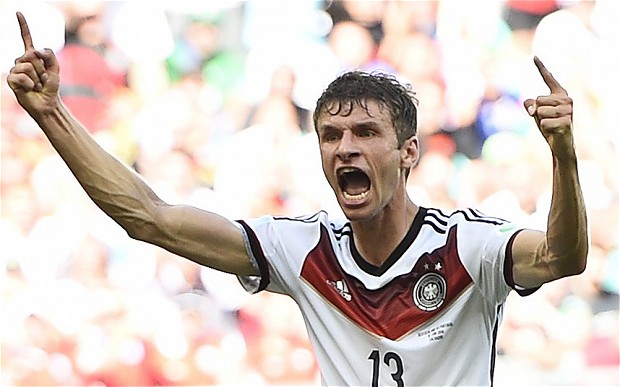
Germany’s much-ballyhooed rebuilding program has become the default reasoning behind Sunday’s World Cup trophy, but they’re nowhere special without one young gun in particular, Tomas Mueller.
One of the practical joys of watching any proper soccer tournament is the breadth of exposure given to teams that matter. The group phase can be tedious. When the world’s best teams congregate, some also-rans are surely caught in the crossfire. But these three games provide an early indication of who’s got what, and the first two knockout game effectively produce four worthy semifinalists — not the best four teams in the world, but the best in this tournament.
This is true of any tournament, but it just so happens that World Cups, European Championships, and, to a lesser extent, Copas Mundial, are televised. But if you watched your kid’s U-14 tournament upstate, and it deployed this standard competitive format, and you watched pretty much every game (which you can’t, because they aren’t televised), you would nevertheless enjoy the same qualitative and quantitative exposure to the most worthy combatants in the competition.
After watching Germany and Argentina play six times, Brazil and Holland six times, and all the quarterfinalists five times, it’s now clear the 2014 FIFA World Cup successfully identified Germany as the tournament’s best team. And so we should applaud the 1-0 result because it was both just and deserved.
This is a championship process most Americans “identify” more with golf and the USGA, whose famously punishing course setups are designed not to do anything abstract like protect par, or give the world’s best players some lesson in humility, but to identify the best player over four days of play.
Here our good friends at FIFA do a comparable and creditable job, mainly because they can’t screw it up — not the breadth of exposure part anyway. This format isn’t anything peculiar or innovative from FIFA. Again, it’s how soccer tournaments are run at the African Cup of Nations and the Crossroads Challenge here in New Gloucester, Maine.
Results can be stolen, or given away, but tournaments seldom are.
I thought Argentina were actually very good in the final, the first half especially. I don’t know why they took off the effective Lavezzi, though if Aguero is healthy, one supposes one must play him. Whether they can tactically be played together, or not, is something on which I’m not comfortable challenging Coach Carlos Sabella, who generally played his hand well.
But the Germans were superior and now we hear why/how exactly it was they scaled these heights. Once Vlad Putin had leaned over and congratulated Angela Merkel on the victory, there ensued a hale of sobriquet-laden analysis re. Das German Reboot, the overhaul of Germany’s player evaluation and academy systems that launched in 2000, whereupon the Germans had gone 4 whole years without winning anything (one has to go all the way back to the 1996 Euros in England; prior to that, World Cup Italia 1990 — those are high standards).
Lost in amid all this bootlicking is this irrefutable fact: It’s a damned good thing for the United States that Germany stepped up that player development effort when they did. With a surfeit of young talent, Merkel’s Boys can afford to let players like John Brooks, Julian Greene, Fabian Johnson and Jermaine Jones play for us!
And who’s the U.S. coach? Jurgen Klinsmann, a figure integral to Das Reboot — he was national team jefe for the 2006 World Cup in Germany, where a very young but promising group (Schweinsteiger, Lahm, Klose, Neuer) was thrown into the fire (under similar, home-country pressures that ultimately poleaxed Brazil) and finished third.
This all wraps up very neatly. They win World Cups, and we just happen to disproportionately benefit from the German scraps, which are better than anything much we can produce on our own. If Das Reboot is successful enough, we should snag some REALLY good castoffs between now and Russia 2018.
